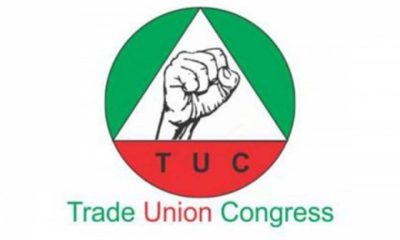NEWS
FIRS Urges Tax Payers Not to Panic over VAT Court Order

By Tony Obiechina, Abuja
The Federal Inland Revenue Service (FIRS) has urged taxpayers not to panic over the recent court ruling by the Federal High Court sitting in Port Harcourt which dismissed its motion for stay of execution of the judgment that Rivers State can collect Value Added Taxes from its residents
The FIRS which disclosed this in a statement by the Special Assistant to Chairman on Media and Communications, Johannes Wojuola in Abuja yesterday, said “until the Court of Appeal, or even the Supreme Court, determines the matter, tax payers are required to continue to comply with their Value Added Tax (VAT) obligations within the status quo framework.
”“The FIRS having lodged, in the Court of Appeal, both an appeal against the decision of the Federal High Court sitting in Rivers State in Suit No.
FHC/PH/CS/149/2020, Attorney General of Rivers State Vs Federal Inland Revenue Service, and an injunction pending appeal of the said judgement, assures taxpayers that there was no cause for alarm.“The Federal High Court ruling should not breed any confusion as to the obligations of taxpayers. Taxpayers must continue to comply with the Value Added Tax Act pending the final determination of appeal.
“Taxpayers must continue to honour their tax obligations under the VAT Act. Failure to do this would put them on collision course with the law,” the statement said.
“For the avoidance of doubt, records of appeal have been transmitted to the appellate court. The Service is confident that, given the extant laws, the arguments and case put forward, it will earn a favoured judgment at the appellate court,” the statement added.
Education
Varsity Don Advocates Establishment of National Bureau for Ethnic Relations, Inter-Group Unity

By David Torough, Abuja
A university scholar, Prof. Uji Wilfred of the Department of History and International Studies, Federal University of Lafia, has called on the Federal Government to establish a National Bureau for Ethnic Relations to strengthen inter-group unity and address the deep-seated ethnic tensions in Nigeria, particularly in the North Central region.
Prof.
Wilfred, in a paper drawing from years of research, argued that the six states of the North Central—Kwara, Niger, Kogi, Benue, Plateau, and Nasarawa share long-standing historical, cultural, and economic ties that have been eroded by arbitrary state boundaries and ethnic politics.According to him, pre-colonial North Central Nigeria was home to a rich mix of ethnic groups—including Nupe, Gwari, Gbagi, Eggon, Igala, Idoma, Jukun, Alago, Tiv, Birom, Tarok, Angas, among others, who coexisted through indigenous peace mechanisms.
These communities, he noted, were amalgamated by British colonial authorities under the Northern Region, first headquartered in Lokoja before being moved to Kaduna.
He stressed that state creation, which was intended to promote minority inclusion, has in some cases fueled exclusionary politics and ethnic tensions. “It is historically misleading,” Wilfred stated, “to regard certain ethnic nationalities as mere tenant settlers in states where they have deep indigenous roots.”
The don warned that such narratives have been exploited by political elites for land grabbing, ethnic cleansing, and violent conflicts, undermining security in the sub-region.
He likened Nigeria’s ethnic question to America’s historic “race question” and urged the adoption of structures similar to the Freedmen’s Bureau, which addressed racial inequality in post-emancipation America through affirmative action and equitable representation.
Wilfred acknowledged the recent creation of the North Central Development Commission by President Bola Tinubu as a step in the right direction, but said its mandate may not be sufficient to address ethnic relations.
He urged the federal government to either expand the commission’s role or create a dedicated Bureau for Ethnic Relations in all six geo-political zones to foster reconciliation, equality, and sustainable development.
Quoting African-American scholar W.E.B. Du Bois, Prof. Wilfred concluded that the challenge of Nigeria in the 21st century is fundamentally one of ethnic relations, which must be addressed with deliberate policies for unity and integration.
Foreign News
Madonna Urges Pope Leo to Visit Gaza

Pop icon Madonna has made an appeal to Pope Leo XIV, urging him to visit the blockaded Gaza Strip amid a starvation crisis that has sparked international outrage.
“You are the only one of us that cannot be denied entry,” the U.S. singer wrote on social media platform X late on Monday.
“We need the humanitarian gates to be fully opened to save these innocent children.
“There is no more time,” she added.
Marking the 25th birthday of her son Rocco Ritchie on Monday, Madonna also announced plans to donate to humanitarian organisations working in Gaza.
“I feel the best gift I can give to him as a Mother is to ask everyone to do what they can to help save the innocent children caught in the crossfire in Gaza,” she wrote.
A United Nations (UN) agency said late last week that “acute malnutrition among children in Gaza has reached the highest levels.”
In July alone, nearly 12,000 children lower than five in age were identified as acutely malnourished, with another 2,500 found to suffer from severe acute malnutrition.
According to the UN Office for the Coordination of Humanitarian Affairs (OCHA), this is the most life-threatening form.
Israel controls access roads to Gaza and has sealed off the coastal area.
Very little aid got into Gaza from March through May, when Israel began allowing in deliveries using a controversial private system that bypasses traditional UN agencies.
Under pressure from allies, Israel recently began permitting larger convoys into the territory, as aid airdrops take place overhead.
On Sunday, Irish rock band U2 issued a stinging critique of the Israeli government’s actions.
“We know Hamas are using starvation as a weapon in the war, but now so too is Israel and I feel revulsion for the moral failure,” frontman Bono wrote.
Foreign News
Putin Bans Foreign-made Clothing for Russian Army From 2026

Russian President Vladimir Putin signed a decree on Monday banning the procurement of foreign-made clothing and related gear for the country’s armed forces starting in 2026.
According to the decree, from Jan. 1, 2026, all uniforms and other clothing items for the Russian Armed Forces must be produced by Russian companies whose manufacturing facilities are located within the country.
By 2027, the requirement would extend to fabrics and knitted materials used in production, which must be domestically manufactured.
The measure aims to entirely exclude the purchase of foreign-made clothing and materials for the needs of the military, the decree said.
Military clothing and gear include uniforms, insignia, underwear, bedding, special clothing, footwear, equipment, and sanitary items.
Such supplies are procured through the Russian state defence order system.
























